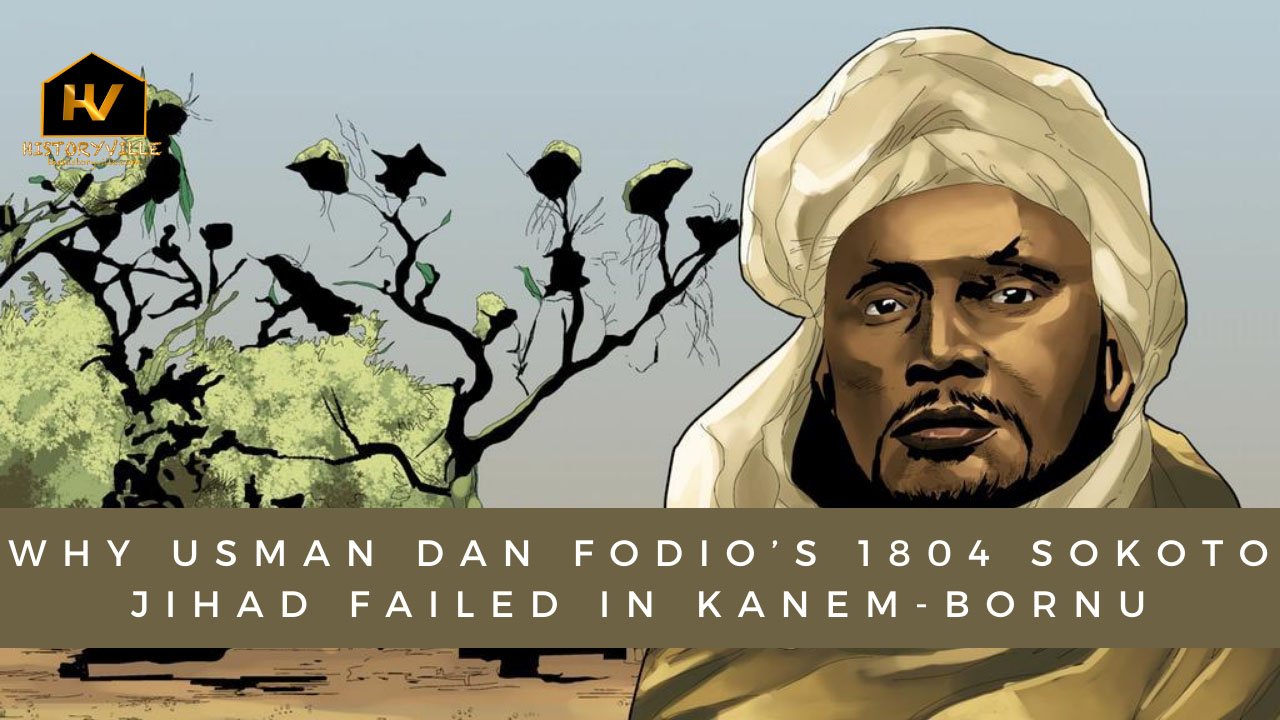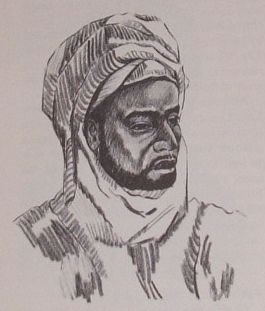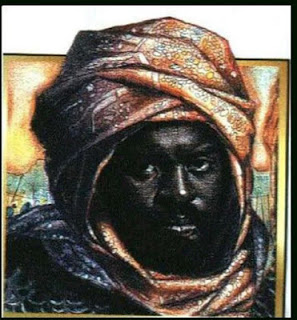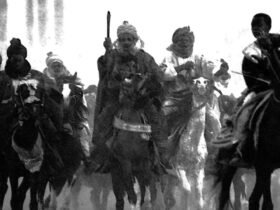No products in the cart.

Usman dan Fodio also known by the Hausa faithful as “The Sheu” was a scholar from West Africa as well as a religious teacher, revolutionary, writer, and the pioneer of the Sokoto caliphate. He was the brain box behind the unrest of the socio-political sphere in Hausa land that eventually led to the 1804 Sokoto Jihad which engulfed present-day Northern Nigeria until it was stopped by Muhammad Al-Kānemī’s forces in Kanem-Bornu.
Thus, despite its relative success, the jihad failed in Bornu. The reasons that lead to the failure of this jihad, are the discourse of this article.
Early Life and Education
Usman dan Fodio was born in the year 1754 in Marrata, Gobir (a then Hausa state) but grew up in Degel town. He and his brother Abdullahi were taught mainly the Koran by their father. Their father also provided them with the best Islamic education there was at the time. Little wonder why Usman dan Fodio could travel throughout Hausa land and as far away as the Saharan city of Agadez, studying under various teachers notably, Mallam Jubril and Mallam Usman Binduri.
Contents

When he was about 20 years old, dan Fodio became a travelling preacher and teacher while he was still studying. At the crux of his studies, he became an expert in the Arabic language and Islamic theology and was already a master in public speaking and poetry writing.
Usman dan Fodio as an Activist and a Preacher
Usman dan Fodio used his wealth of knowledge to attract devoted disciples. He rapidly got followership within his community which encouraged him to travel to other Hausa states where he was met with further luck in attracting more students.
Dan Fodio and his disciples began to call upon the nominal Muslim rulers in Hausa land to accept and practice orthodox Islam and to remove from their courts, non-Islamic customs and habits. He urged them to stop tolerating paganism, worshipping idols, believing in the power of divination and simply to be governed by the strict principles of the Qādiriyah law.
Dan Fodio also questioned the unfair enslavement and taxation of the Fulanis by the local rulers. Furthermore, he revolted against the unlawful confiscation of properties belonging to the peasants in the community.
Many have also termed Usman dan Fodio an activist for women’s rights because part of his clamour against the local rulers then was their treatment of women. Women during this period were regarded as second-class citizens. They were denied education as well as other basic social amenities. Even worse, in the name of religion, they were made to observe purdahs which often resulted in long-lasting imprisonment.
Why the 1804 Sokoto Jihad?
Usman dan Fodio’s plights for a fairer and more humane treatment of his Fulani brethren can be traced to a series of visions he’d had where he believed that the prophet Muhammad and Abd al-Qadir-Jilani, founder of the Qadiriyya order, mandated him to pick up the Sword of Truth in order for his followers to defend themselves from their wicked and selfish rulers.
All of these put Usman dan Fodio at odds with the local kings to the extent that in 1802, Yunfa, the ruler of Gobir attempted to assassinate him. Dan Fodio and his followers had to flee into the province of Gudu, where they turned to the local Fulani nomads for help and refuge. This would be a premise for the 1804 Sokoto Jihad.
The Conquest of the Hausa States and the Birth of the Sokoto Caliphate
By 1804, Usman dan Fodio felt he had no other option but to declare jihad to implement these revolutions which he dearly sought. He took on the role of Amir al-Mumineen (Commander of the Faithful) and the call for jihad travelled far and wide the Hausa land including notable states such as Kano, Daura, Katsina, Zaria, Borno, Gombe, Adamawa, and Nupe. These places were largely occupied by the Fulani people.
A widespread insurgency began in Hausa land. The insurgents were predominantly composed of an army of Fulanis and other Hausa peasants who had had enough of the oppression of their overlords. They grabbed the opportunity to free themselves from slavery and the illegal taxation to which they had been subjected for years.

Worthy of note is that dan Fodio never personally led an army nor fought in a battle; his role was strictly spiritual and consultative. He left the army in the hands of his generals, including his brother, Abdullahi, and son, Mohammed Bello.
By 1808, four years since the 1804 Sokoto Jihad began, almost all the Hausa rulers had been replaced by Fulani emirs who recognised and submitted to the supreme authority of Usman Dan Fodio. The cumulation of all the lands they had conquered and taken territory, formed the famous Sokoto Caliphate.
In 1812, the leadership of the Sokoto Caliphate was divided between Abdullahi and Mohammed Bello, while dan Fodio stepped back and retired into a secluded lifestyle where he continued teaching and writing but distanced from the political matters within the caliphate.
Why did the 1804 Sokoto Jihad Fail in Kanem-Bornu?
The only real opposition to the 1804 Sokoto Jihad was Kanem-Bornu. In 1808, the Fulanis intended to penetrate the jihad in Kanem-Bornu (a combination of two states, Kanem and Bornu). However, these regions had their own clerical class and traditions; Muhammad Al-Kānemī, leader of the Kanem province, contested the Fulani advance.

Image Credit: Wikipedia
Al-Kānemī was an Islamic scholar and a warlord non-Sayfawa who had formed a coalition of Shuwa Arabs, Kanembu, and other semi-nomadic people. He rebelled against the 1804 Sokoto Jihad on the ground that the so-called Fulani clerics had no right to interpret Muslim law for the governance of humanity.
By 1826, Al-Kānemī was the ruling master of a new Islamic state, while the Mais (original traditional Bornu state rulers before the merger of Kanem-Bornu) retained office until 1846. Umar, Al-Kānemī ‘s son, eventually ended this age-long dynasty of the Mais when he succeeded the last standing Mai.
Another reason for the failure of the Usman dan Fodio 1804 Sokoto Jihad in Kanem-Bornu may be attributed to the fact that the people believed that the task of making Islam known to all rested on them as individuals. That is, they believed every Muslim has the capacity to carry the message of the Prophet to others. Their prophetic tradition says: “Preach even if it may be one verse.”
Thus, the Kanem-Bornu people preferred and adopted peaceful means of spreading Islam and not the forceful methods Usman dan Fodio and his Fulani scholars had used in other states.
Not long afterwards, the Kanem-Bornu state was met with a decline because Umar could not meet up with his father’s pace and he gradually allowed the kingdom to be ruled by advisers.
Eventually, the state was occupied by the British at the turn of the 20th century and joined with other British colonial territories that have become Nigeria today.
Are there other reasons you would like to share with us as to why the 1804 Sokoto Jihad failed in Borno? Kindly let us know in the comments.
We always have more stories to tell. So, make sure you are subscribed to our YouTube Channel and have pressed the bell button to receive notifications for interesting historical videos. Also, don’t hesitate to follow us on all our social media handles and to as well share this article with your friends.
Feel free to join our YouTube membership to enjoy awesome perks. More details here…
Sources
Age of Revolution. (n.d.). Usman Dan Fodio. Age of Revolution. Retrieved from http://historyworldsome.blogspot.com/2013/10/usman-dan-fodio.html. Accessed May 9, 2020.
Lumen Candela. (n.d.). Bornu Empire. OER Services. Retrieved from https://courses.lumenlearning.com/suny-hccc-worldcivilization/chapter/bornu-empire/. Accessed May 12, 2020.
Omotoso, D. (n.d.). ISL 372: Islam in Nigeria. NOUN. Retrieved from https://nou.edu.ng/sites/default/files/2017-03/ISL372.pdf. Accessed May 12, 2020.
Featured Image Credit: DW







I am impressed by your narration on why the Jihad could not make any headway to Kanem Borno Empire in the 19th century when the combination of Commanders Abdullahi and Bello tried. Oral history has it that the tribes in western Borno formed a formidable obstacle to the forage into Borno because of their independent states and strong armies that the warlords from Sokoto could not overcome. These tribes were Bade, Ngizim , Karai-Karai. Can I have your comment on this thesis?